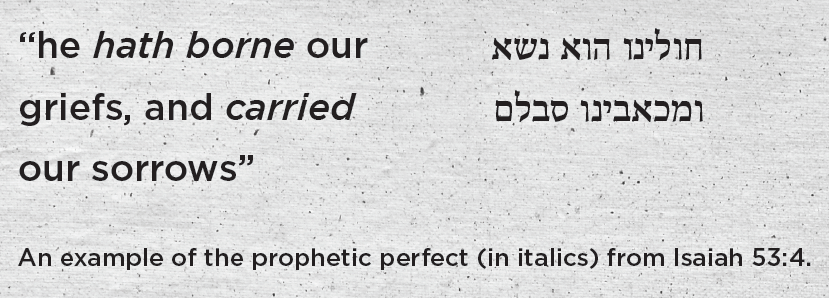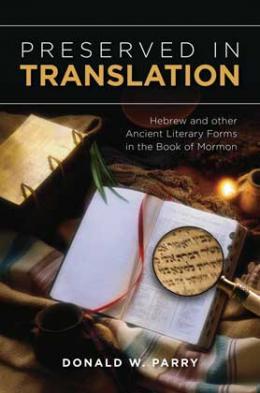The Prophetic Perfect Tense
"he has borne our griefs" (Isaiah 53:4)
On occasion the Old Testament prophets used the grammatical past tense or the present- or past-perfect tenses when referring to future events.[1] Seven centuries before the crucifixion of Christ, for example, Isaiah wrote that the Messiah “was wounded for our transgressions” (Isaiah 53:5) instead of “will be wounded for our transgressions.” Some biblical Hebrew scholars call this phenomenon the “prophetic perfect” or the “prophetic past tense.”
Isaiah repeatedly used the prophetic perfect in prophesying of Jesus Christ’s atoning sacrifice: “He hath borne our griefs, and carried our sorrows” (Isaiah 53:4); “He was bruised for our iniquities” (53:5); “The chastisement of our peace was upon him” (53:5); “The Lord hath laid on him the iniquity of us all” (53:6); “He was oppressed, and he was afflicted” (53:7); “He was cut off out of the land of the living” (53:8); and “For the transgression of my people was he stricken” (53:8). These are only a few of the examples of the prophetic perfect in the Old Testament.

Book of Mormon prophets also occasionally used the prophetic perfect in their prophecies. Lehi declared, “I have obtained a land of promise” (1 Nephi 5:5) long before he actually arrived in the promised land. Nephi spoke of Jesus’s baptism and reception of the Holy Ghost as though those events had already happened: “Wherefore, after he was baptized with water the Holy Ghost descended upon him in the form of a dove” (2 Nephi 31:8).
Why did God’s prophets employ the prophetic perfect? Apparently they were so certain that their prophecies would come to pass that they spoke in the past tense, as if the prophecy had already been fulfilled. This view aligns with the position of biblical scholar Wilhelm Gesenius, who noted that the prophets sometimes used these forms to “express facts which are undoubtedly imminent, and, therefore, in the imagination of the speaker, already accomplished.”[2]
The Book of Mormon prophet Abinadi employed the prophetic perfect and explained its use when, after quoting Isaiah 53, he said, “Now if Christ had not come into the world, speaking of things to come as though they had already come, there could have been no redemption” (Mosiah 16:6). That is to say, Abinadi spoke of important religious events as if they had already occurred.
Similarly, Jarom explains this mode of expression in recording that prophets, priests, and teachers taught the law of Moses, “persuading [the Nephites] to look forward unto the Messiah, and believe in him to come as though he already was” (Jarom 1:11). Further, King Benjamin stated, “The Lord God hath sent his holy prophets among all the children of men . . . that thereby whosoever should believe that Christ should come, the same might receive remission of their sins, and rejoice with exceedingly great joy, even as though he had already come among them” (Mosiah 3:13). In a related way, Moroni also explains his prophetic perspective. Speaking to future generations, he writes, “Behold, I speak unto you as if ye were present, and yet ye are not. But behold, Jesus Christ hath shown you unto me, and I know your doing” (Mormon 8:35).
Notes
[1] See Ricks, “Use of Verb Tenses in Prophecy”; and Parry, “Hebraisms and Other Ancient Peculiarities,” 164–66. “In prophecies a future event is sometimes regarded as having already been accomplished.” Joüon and Muraoka, Grammar of Biblical Hebrew, 363.
[2] Gesenius, Hebrew Grammar, 312–13, as quoted in Ricks, “Use of Verb Tenses in Prophecy,” 27.
